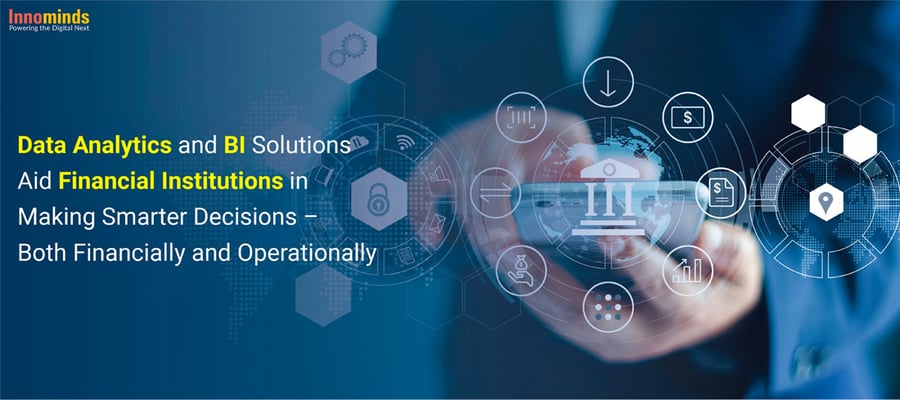 The Banking, Financial Services, and Insurance (BFSI) sector has been advancing in its capabilities owing to the digitization and the pace at which it is being embraced in recent years. Moreover, it is becoming more competitive than ever before, thereby empowering modern customers.
The Banking, Financial Services, and Insurance (BFSI) sector has been advancing in its capabilities owing to the digitization and the pace at which it is being embraced in recent years. Moreover, it is becoming more competitive than ever before, thereby empowering modern customers.
In the past years, big tech companies such as Google, Amazon, and Paytm are expanding their reach into the financial sector, developing payment and banking apps for their customers. They have been breaking into FinTech, by leveraging their active user base, forming alliances with banks, and leveraging the increasing simplicity of API payments integration across their services to gain a foothold in a competitive market. With new technologies around every corner over mobile devices, computers, and the Internet of Things (IoT), the amount of data we produce every day is only projected to increase.
Technologies and tools like Business Intelligence and Data Analytics have been invariably helping banks and financial institutes to reflect all required regulations and stay competitive while attending to the digital needs of today’s customers. Data Analytics and BI Solutions aid financial institutions in making ‘smarter’ decisions – both financially and operationally.
Applications and Benefits of Data Analytics
Recent surveys show that the global Big Data Analytics in BFSI market size is expected to reach USD 86.68 Billion in 2027 and register a steady CAGR of 27.7% during the forecasted period. BFSI companies need to integrate analytics into processes that trigger automated actions and more contextual, real-time decision-making.
 Increasing focus to improve customer lifecycle, growing demand for early fraud detection, and mounting data volume generated by the capital market due to trading and transactions are all driving up demand for Big Data Analytics solutions. Over the forecasted period, these factors are likely to continue to drive the growth of worldwide Big Data Analytics in the BFSI market. In the financial and banking industry, Data Analytics is mostly used in Demand, Supply, and Risk Management. Let's take a closer look at each of them.
Increasing focus to improve customer lifecycle, growing demand for early fraud detection, and mounting data volume generated by the capital market due to trading and transactions are all driving up demand for Big Data Analytics solutions. Over the forecasted period, these factors are likely to continue to drive the growth of worldwide Big Data Analytics in the BFSI market. In the financial and banking industry, Data Analytics is mostly used in Demand, Supply, and Risk Management. Let's take a closer look at each of them.
-
Risk Management: By leveraging the different sources of Big Data, organizations derive a wealth of insight into organizational risk, which allows for assessing and minimizing threats.
When your company applies Data Analytics to Risk Management, a detailed picture emerges that helps structure financial revenue streams and apply predictive indicators to increase organizational growth. Banks and financial organizations utilize Data Analytics to manage risk in the following ways:
- Fraud detection
- Risk modeling for investment banks
- Credit risk analysis
- Operational and liquidity risk
-
Managing Supply Side of the Equation: Financial services industry has been investing heavily for more than a decade in data collection and processing technologies and is one of the forerunners in investments in Big Data technologies. On daily basis, it must deal with the cashflows and customers. What is the total amount of money coming in and going out? How many customers come in? What do they buy? And which ones generate enough revenue to make a difference? Here’re few examples of how financial institutions use analytics to manage supply:
- Sales performance analysis
- Branch and online channel sales analysis
- AI-driven Chatbots & Virtual Assistants
-
Managing Demand Side of the Equation: For financial institutions, the main challenge is managing the demand side of the equation. Banks can benefit from a system that offers them access to a client they might not have had otherwise by focusing on their most profitable customers. To do so, banks must first figure out who their most profitable customers are. This is where analytics comes into the picture by helping financial institutes in:
- Personalized marketing
- Predicting customer lifetime value
- Attracting new customers and reducing churn rate with recommendation engines
Why Financial Institutions Are Investing in Business Intelligence
 Data that are simple to understand and apply to real-life decision-making is something every industry can benefit from. But making sense of a large amount of data available across the banking and finance industries is no easy feat. Manually completing it would be extremely tedious, overwhelming, and time-consuming. While the influx of information brings the opportunity to gain deeper insight into customer behavior and the industry, banks and financial institutions need to implement business intelligence practices to ensure they make the most of the data revolution.
Data that are simple to understand and apply to real-life decision-making is something every industry can benefit from. But making sense of a large amount of data available across the banking and finance industries is no easy feat. Manually completing it would be extremely tedious, overwhelming, and time-consuming. While the influx of information brings the opportunity to gain deeper insight into customer behavior and the industry, banks and financial institutions need to implement business intelligence practices to ensure they make the most of the data revolution.
Data Analytics bolsters a bank's marketing capabilities. Risk, Compliance, Fraud, NPA monitoring, and calculating Value at Risk are just a few of the functional areas that may benefit substantially from analytics to maintain optimal performance and make the right choices when speed is critical. It is not an exaggeration to state that if analytic tools are not made available to banks, their day-to-day operations would be severely constrained and crippled. Banks may utilize analytics to differentiate themselves and stay competitive in the future.
In the present times, Business Intelligence is a lot more than using fancy graphs and pie diagrams to represent data. Here are the top five reasons why modern banks are embracing business intelligence solutions:
- Reporting: BI allows data to be analyzed and compiled into reports that are easy to read and understand. They are also regularly updated.
- Cost reduction: BI allows for analyzing customer data, therefore real costs to serve become more visible. Instead of cutting costs at random, BI dashboards and reports provides high-end visibility and insight to make strategic adjustments.
- Better risk management: With access to data-based actionable insights, banks reduce the chance of risks. With a BI system in place, fraud is easier to detect and mitigate.
- Better view into financial data: By gaining visibility across departments and keeping a close eye on cash flow, a bank would be able to tell which accounts are most used and which ones lie dormant.
- Regulation compliances: The dashboards organize data and create reports for regulatory compliance and reports generated have level-based security measures that ensure the data is accessed only by the necessary user.
Digital technology has had a significant impact on the BFSI business in recent years. It has had a favorable impact on the BFSI sector by allowing banks, financial companies, and insurance companies to contact and engage clients on a larger scale. With its sophisticated analytics capabilities, Innominds helps its clients establish risk profiles, acquire insights into customer behavior, and forecast fraudulent transactions.
The efficiency of your internal organization is equally as important as your customers’ experience with your firm. Using Business Intelligence software solutions is a data-driven method to assess operational procedures, resource allocation, and the performance of your employees. Leverage Innominds comprehensive Business Intelligence capabilities and Data Engineering expertise to get relevant insights in real-time to create great customer experiences and exceed the expectations of your organization.
With a unified emphasis on Apps, Devices, and Analytics, Innominds provides experience delivering and creating Big Data & Analytics platforms and solutions that enable the BFSI sector to make informed decisions and make significant commercial use of their data.
At Innominds, we have worked with organizations spanning across the globe from different industries and domains. Innominds’ single sign-on, faster, simpler, and more secure access to internal applications can help your organization move to a zero trust security model.
Download the case study and discover different ways in which Innominds can improve your customer experience and prevent fraud access to internal applications from retail store clients/machines.



